
Copyright information
A remarkable experimental school is being killed in Kentucky
WHY MUST LINCOLN DIE?
FOR MANY YEARS, The Lincoln School in Simpsonville, Ky., was a state boarding institution for blacks from towns that couldn't afford separate, segregated high schools. Three years ago, in a changing social climate, Lincoln became something very different: a state-supported boarding high school, 60 percent white, for high IQ youngsters who because of poverty and/or troubled homes were destined to become dropouts.
"Many programs for disadvantaged children have failed because, after six hours of school, the kids go back to the same old rattrap," says Dr. Marvin J. Gold, the school's director. "Here we can completely control the environment, seven days a week, 24 hours a day."
Lincoln has had a full-time psychologist, a psychiatric social worker and a guidance counselor for just 120 students. There was a teacher for every six pupils, and some of the advanced classes had only a single pupil. At night, teachers were on hand for tutoring or just for talking. Failure was not permitted: if a student flunked an exam, he immediately got intensive individual tutoring until he could pass the test.
All 41 of this year's graduates are going on to college with some kind of scholarship aid—an achievement for young girls from bleak Appalachian hamlets, black boys from rural slums and Louisville youths from homes where nobody had ever dreamed of college. For those like 16-year-old Huey Prater, a black from the coal town of Harlan, the notion of college was, until recently, sheer fantasy. There were ten children at home, and no father. His grandmother helped with the support. At Lincoln, Huey whizzed through the high school curriculum in three years with mostly B's. Now, he has a four-year scholarship at Syracuse University that pays all expenses. "I would have been lucky to have finished high school if I had stayed in Harlan," says Huey. "Most of the kids I know drop out when they're sixteen and go to work."
Lincoln's achievements have not impressed all Kentuckians. State Sen. Mack Walters from nearby Shelbyville called the school a "luxury" and introduced legislation to abolish it. He objected to Lincoln's spending nearly $5,000 a year per pupil while Shelbyville spent only $500 per pupil in its own schools. Walters' campaign was successful: after this July 31, there will be no Lincoln School.
"Cost is only part of the reason." believes the Rev. Kirk Neely, a white Southern Baptist and the school's chaplain. "There is suspicion on the part of the people in this area of any program where blacks and whites mix freely. Part of the feeling is against poor people getting such a good education, but part is just plain racism."
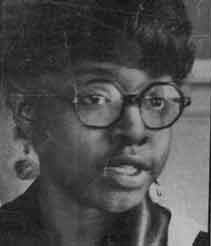
Aritha Gardner, one of nine children of a Louisville janitor, was called "cynical and hostile" when she came to Lincoln. 'I didn't know there were teachers who cared," she says now. Aritha got scholarship offers from Washington University, Chicago, and (the one she took) Stanford. "I got a lucky chance," she says.

Michael Stadther was bored with school until he came to Lincoln. Here, he setup a science lab, wrote a math book with a teacher and at night acquired 20 college credits. From among four college offers, Michael has chosen Tulane.

Terry Eldridge, who is going to college at 15, was a year and a half behind in math when she came to Lincoln. In three weeks, she caught up, and in two and a half years, had finished six math courses. DannyBell, 15 (page 65), says he undoubtedly would have been a dropout if he hadn't been sent to Lincoln. His story follows.
TEXT BY JACK STAR PHOTOGRAPHS BY JAMES H. KARALES
64 LOOK 8-11-70
TEXT BY JACK STAR PHOTOGRAPHS BY JAMES H. KARALES
64 LOOK 8-11-70

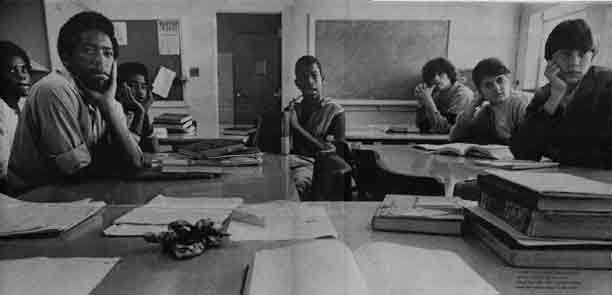
In their tiny classes, Danny and his fellow students get so intent about learning, they sometimes take over the room to teach each other.
"School wasn't for me. I thought if dropping out as soon as I could and getting a job in a gas station. I thought I would join the Army when I was 17."

Gym class is compulsory and exuberant.
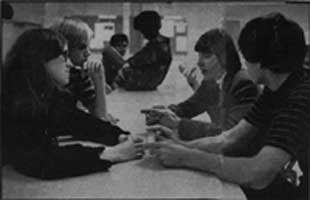
After supper, the dining hall becomes a place where ideas are digested.
Danny Bell had fewer troubles than most of his classmates, but they were enough to threaten his future. When Danny was only nine, his father died suddenly, and Danny's mother, with six children to support, had to take a job. A talented child, Danny nevertheless was thrown out of the advanced program in eighth grade. "I just didn't do my work," says Danny. "School wasn't for me. I thought of dropping out as soon as I could and getting a job in a gas station. I thought I would join the Army when I was 17." But two years at Lincoln were enough to turn Danny around. He piled up three years of credits and. in the process, found he was enjoying himself. "Learning," he says, "is great."
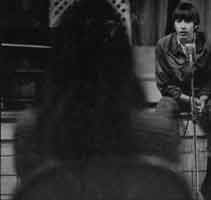
At school talent show, Danny recites his own poetry.
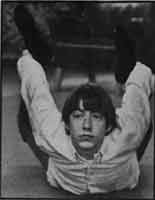
Curious, he joins special yoga class.
66, 67 LOOK 8-11-70
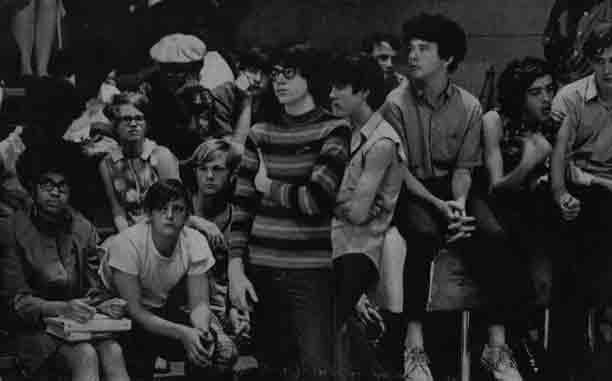
At an assembly to consider the Indochina war, the students inevitably wonder what the future has in store for them.
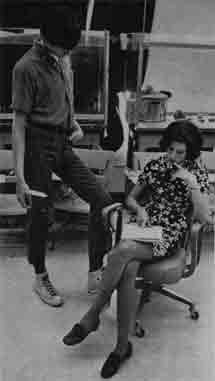
Above, Miss Stack and Danny focus on science.

In library, he is oblivious to blaring rock record.
Will Danny make it? Only two years have passed since he was looking forward to being a dropout. Principal Samuel Robinson, who has been at Lincoln for ten years, is sure that Danny has changed. "Danny was very angry when he first came here," says Robinson. "He was always asking:
Also going down the drain is one of the most hopeful experiments in integrated living in Kentucky history. Despite a growing militancy on the part of Lincoln's younger black students, black and white Southerners lived and studied here in close proximity and remarkable amity.
"I guess this is what has been bothering our white neighbors," says Dr. Gold, regretfully. "They don't like to see black and white kids together."
68 LOOK 8-11-70
Copyright 2000-2025 © All rights reserved.